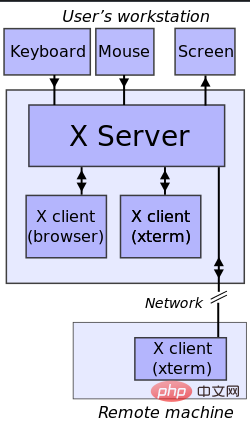What is x11 in linux
In Linux, "X11" refers to "X Window System", which is a graphical window management system; "X11" was born in Unix and OpenVMS, and is the standard for establishing graphical user interfaces in the traditional Unix environment. Toolkits and protocols, and the graphical management interface under the Linux operating system are also developed based on the X11 runtime library.

#The operating environment of this tutorial: linux7.3 system, Dell G3 computer.
What is x11 in Linux
X11 is also called the X Window system, which is a graphical window management system. It was born in Unix and OpenVMS and is a standard toolkit and protocol for building graphical user interfaces in the traditional Unix environment.
The graphical management interface (GNOME, KDE) under the Linux operating system is also developed based on the X11 runtime library.
X Window System (X Window System, also often called X11 or X) is a software window system displayed in bitmap mode. Originally developed as research at MIT in 1984, it has since become an operating protocol for standardized software toolkits and display architectures used by operating systems such as UNIX, UNIX-like, and OpenVMS. The X Window System uses software tools and architectural protocols to create graphical user interfaces for operating systems, and has since gradually expanded to apply to a variety of other operating systems. Almost all operating systems now support and use X. More importantly, today's well-known desktop environments-GNOME and KDE are also built on the X Window System.
X Window System is referred to as X, or X11, or X-Windows. It is called X because X is located after W in the alphabet, and W is the GUI system used by MIT before X.
The reason why it is called X11 is because in 1987, the X Window System has evolved to the 11th version. All subsequent Xs are developed based on the X11 version (the changes are not big) ). For convenience, we will refer to X Window System as X in the future.
Extended knowledge
Since Only in this way can there be a truly usable and executable entity, which can be called an implementation entity. Among the implementations currently developed and written based on the standard architecture of X, X.Org is the most common and popular.

In the illustration, the X server obtains input information from the keyboard and mouse, and then displays the input feedback on the screen, while the web browser and terminal emulator perform the run on the computer system.
In addition, the client also maintains contact with remote machines and servers through the network to ensure that the message status is updated. Such a mechanism and architecture can make remotely run software run as if it were running on the local machine.
Recommended learning: Linux video tutorial
The above is the detailed content of What is x11 in linux. For more information, please follow other related articles on the PHP Chinese website!

Hot AI Tools

Undresser.AI Undress
AI-powered app for creating realistic nude photos

AI Clothes Remover
Online AI tool for removing clothes from photos.

Undress AI Tool
Undress images for free

Clothoff.io
AI clothes remover

Video Face Swap
Swap faces in any video effortlessly with our completely free AI face swap tool!

Hot Article

Hot Tools

Notepad++7.3.1
Easy-to-use and free code editor

SublimeText3 Chinese version
Chinese version, very easy to use

Zend Studio 13.0.1
Powerful PHP integrated development environment

Dreamweaver CS6
Visual web development tools

SublimeText3 Mac version
God-level code editing software (SublimeText3)

Hot Topics
 What computer configuration is required for vscode
Apr 15, 2025 pm 09:48 PM
What computer configuration is required for vscode
Apr 15, 2025 pm 09:48 PM
VS Code system requirements: Operating system: Windows 10 and above, macOS 10.12 and above, Linux distribution processor: minimum 1.6 GHz, recommended 2.0 GHz and above memory: minimum 512 MB, recommended 4 GB and above storage space: minimum 250 MB, recommended 1 GB and above other requirements: stable network connection, Xorg/Wayland (Linux)
 Linux Architecture: Unveiling the 5 Basic Components
Apr 20, 2025 am 12:04 AM
Linux Architecture: Unveiling the 5 Basic Components
Apr 20, 2025 am 12:04 AM
The five basic components of the Linux system are: 1. Kernel, 2. System library, 3. System utilities, 4. Graphical user interface, 5. Applications. The kernel manages hardware resources, the system library provides precompiled functions, system utilities are used for system management, the GUI provides visual interaction, and applications use these components to implement functions.
 How to run java code in notepad
Apr 16, 2025 pm 07:39 PM
How to run java code in notepad
Apr 16, 2025 pm 07:39 PM
Although Notepad cannot run Java code directly, it can be achieved by using other tools: using the command line compiler (javac) to generate a bytecode file (filename.class). Use the Java interpreter (java) to interpret bytecode, execute the code, and output the result.
 vscode cannot install extension
Apr 15, 2025 pm 07:18 PM
vscode cannot install extension
Apr 15, 2025 pm 07:18 PM
The reasons for the installation of VS Code extensions may be: network instability, insufficient permissions, system compatibility issues, VS Code version is too old, antivirus software or firewall interference. By checking network connections, permissions, log files, updating VS Code, disabling security software, and restarting VS Code or computers, you can gradually troubleshoot and resolve issues.
 How to check the warehouse address of git
Apr 17, 2025 pm 01:54 PM
How to check the warehouse address of git
Apr 17, 2025 pm 01:54 PM
To view the Git repository address, perform the following steps: 1. Open the command line and navigate to the repository directory; 2. Run the "git remote -v" command; 3. View the repository name in the output and its corresponding address.
 Can vscode be used for mac
Apr 15, 2025 pm 07:36 PM
Can vscode be used for mac
Apr 15, 2025 pm 07:36 PM
VS Code is available on Mac. It has powerful extensions, Git integration, terminal and debugger, and also offers a wealth of setup options. However, for particularly large projects or highly professional development, VS Code may have performance or functional limitations.
 vscode terminal usage tutorial
Apr 15, 2025 pm 10:09 PM
vscode terminal usage tutorial
Apr 15, 2025 pm 10:09 PM
vscode built-in terminal is a development tool that allows running commands and scripts within the editor to simplify the development process. How to use vscode terminal: Open the terminal with the shortcut key (Ctrl/Cmd). Enter a command or run the script. Use hotkeys (such as Ctrl L to clear the terminal). Change the working directory (such as the cd command). Advanced features include debug mode, automatic code snippet completion, and interactive command history.
 How to use VSCode
Apr 15, 2025 pm 11:21 PM
How to use VSCode
Apr 15, 2025 pm 11:21 PM
Visual Studio Code (VSCode) is a cross-platform, open source and free code editor developed by Microsoft. It is known for its lightweight, scalability and support for a wide range of programming languages. To install VSCode, please visit the official website to download and run the installer. When using VSCode, you can create new projects, edit code, debug code, navigate projects, expand VSCode, and manage settings. VSCode is available for Windows, macOS, and Linux, supports multiple programming languages and provides various extensions through Marketplace. Its advantages include lightweight, scalability, extensive language support, rich features and version






